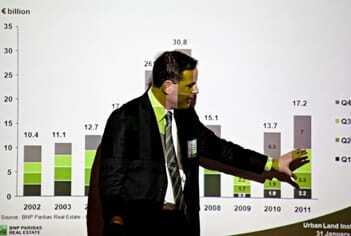This year will be defined by continued uncertainty and limited availability of real estate debt, according to Emerging Trends in Real Estate Europe 2012, the annual industry forecast published by the Urban Land Institute (ULI) and PricewaterhouseCoopers (PwC) that includes interviews with, and surveys of, more than 600 commercial property professionals across Europe.
As a result, Joe Montgomery, chief executive of ULI Europe, says he expects the market to be characterized by “deferred decisions on the part of those signing leases and the prospect of assets being released by banks or by others facing distress, creating opportunities for those who have equity or assured lines of debt.”
The report predicts that property financing will be hit by the measures banks take to tackle regulatory and macroeconomic pressures; deleveraging will not free up capital for fresh property lending; debt will become more short-term and expensive; and the need to find alternative sources of funding will become imperative.
“Debt will be the main story of 2012,” insists ULI member John Forbes, real estate partner at PwC as well as author of the report. “The economic situation creates a major issue for the capital markets, particularly with regard to the banks having to reduce their risk-weighted assets, which means less real estate lending overall. There is general pessimism regarding the availability of debt this year and—significantly—lenders are the gloomiest of all.”
Just 6 percent of lenders say they believe that debt will be as available as it was in 2011, with 42 percent expecting it to be moderately less available and 52 percent anticipating a substantial decline. “It’s going to be harder to get debt so it will disadvantage people [who] need to refinance, but it will create opportunities for others—in particular, equity investors less reliant on borrowing, those who are able to take advantage of the stuff that comes tumbling out of the banks, and new debt providers entering the market,” Forbes adds.
The report says that the prospects for any turnaround this year hinge on how recent regulatory measures will affect banks’ willingness to make commercial loans, and whether another financial industry collapse caused by sovereign debt issues ultimately triggers a widespread release of assets by banks to investors.
As Montgomery points out, “The profound instability is affecting the providers of equity and debt. We are operating in an environment where deleveraging and de-risking is [the] order of the day. All of this takes place in a context where broader economic concerns complicate matters further, with public sector austerity measures and questions around the future of the euro creating even more uncertainty.” Furthermore, the uncertainty over the level of banks’ exposure to sovereign debt default, coupled with uncertainty over the regulatory changes introduced as a result, has caused significant elements of the capital markets to be reduced to “a state of near paralysis,” he says.
| Joe Montgomery, chief executive of ULI Europe |
The silver lining is that respondents’ opinion regarding the availability of equity is much more positive. Most promising is the response from institutional investors: 65 percent believe that equity will be moderately more available, with a further 10 percent betting that equity will be substantially more available. The view is widespread that the pressure on investors to invest is increasing, although when and how investors will choose to deploy their capital is less certain given the uncertainty regarding regulation.
Europe’s economic crisis has left real estate investment and development in limbo – little relief expected in Emerging Trends in Real Estate® Europe 2012.






